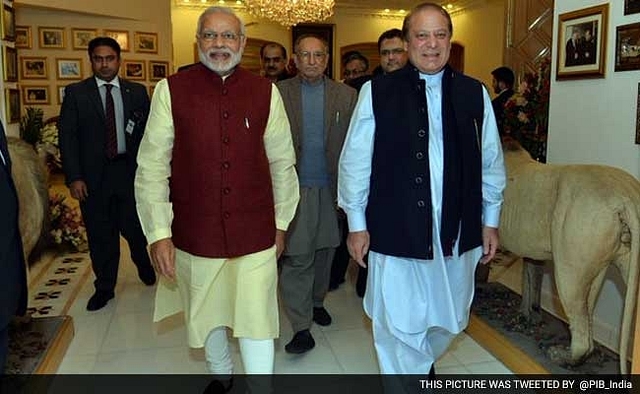
Modi's Lahore Trip: Good Move, But Keep The Powder Dry
The Lahore visit suggests that a broad and consistent policy of engagement with Pakistan is falling into place. But India should always keep the powder dry and not lower its guard.
Prime Minister Narendra Modi did the unexpected when he dashed to Lahore for a brief tete-a-teete with Pakistan Prime Minister Nawaz Sharif. The official reason given, that it was a spontaneous decision to land up in Lahore to wish Sharif on his birthday on the way back from Afghanistan, is obviously just a story. These things don’t happen on a whim and fancy. A lot of planning went into it. After Ufa, Paris, NSA-level talks in Bangkok and a Sushma Swaraj visit to Pakistan, a PM visit can hardly be called unplanned.
The Lahore visit suggests that a broad and consistent policy of engagement with Pakistan is falling into place. This is a welcome change from the stop-go nature of recent exchanges, when talks got repeatedly suspended whenever Pakistan made provocative gestures.
A few observations are worth making about this latest move.
First, Modi is now driving Pakistan policy directly and he is convinced that talks are vital even if they don’t always yield anything concrete. He is right on this. Not talking is not an option – it only makes the world more anxious what two nuclear powers are upto, and increases the possibility of unexpected descent into conflict.
Second, given the secrecy involved in the visit, it is clear that the government will conduct its major diplomatic moves away from the glare of publicity. This is sensible as important negotiations cannot be allowed to be sabotaged by media buildup and controversy. The Congress carping about the PM’s sudden visit is just that – carping without cause.
Third, the government sees that there is a small constituency in Pakistan for peace, even while acknowledging that elements in the Pakistan army, the ISI and the terrorist groups will continue to queer the pitch. In fact, just as Atal Behari Vajpayee’s Lahore bus trip ended in Kargil, Modi’s Lahore trip too will surely bring forth the spoilers. But this time the government may be ready for it, and not give the generals and jihadis reason to celebrate another deterioration in Indo-Pak ties.
Fourth, with Ajit Doval as NSA and Modi as PM, the focus on talks will actually be more realistic in terms of expectations. Issues like trade and visas could move forward, but expecting deals on Siachen or LOC will be tougher. On the ground, though, they should know that India always has to keep the powder dry and not lower its guard.
Fifth, we have to have an SOP for dealing with likely disruptions. A terror attack, more firing on the LOC, provocative statements from the Pakistan army, and a deliberate effort to stoke trouble in the Kashmir Valley should be expected. Instead of breaking off talks, we should immediately send someone to Islamabad for talks to convey our concerns and condemnation. We can also plan our own counter-measures whenever terror strikes – as it surely will. The Lashkar-e-Toiba and Jaish-e-Mohammad are not going to like any prospect of India and Pakistan even attempting to solve some of their problems.
Sixth, a key domestic factor propelling Modi towards talks is Jammu & Kashmir, where the BJP is in partnership with the PDP. Any improvement in ties with Pakistan will help the coalition become stronger.
The bottomline in the India-Pakistan relationship is this: the BJP, with its Hindu nationalist image, is the party with the greatest chance of making a durable peace. This is why Vajpayee made all out efforts to reach out to Nawaz Sharif. Modi is doing the same thing, hopefully with better chances of success.